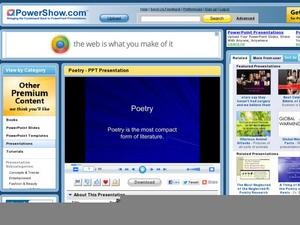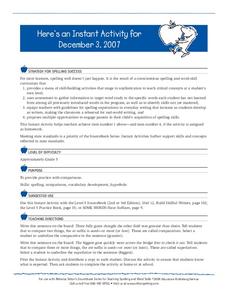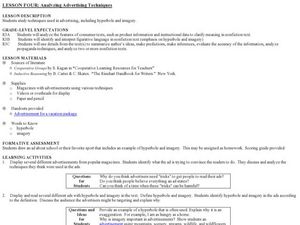K12 Reader
Figurative Language: What Is It?
"Lucky lady." "Straight as an arrow." Here's a figurative language learning exercise that provides middle schoolers with six examples and asks them to identify the literary device modeled.
E Reading Worksheets
Figurative Language Finder
To demonstrate their understanding of figurative language, middle schoolers use a guided reading worksheet to find examples of figurative language in a text, identify the technique being used, and to explain how they were able to...
Mailbox Education Center
On the Hunt: Understanding Figurative Language
Young writers hunt for examples of figurative language in their reading. The hunt requires pupils to cite their sources, record a quoted example for each type of figurative language, and an explanation of what they think the examples...
Curated OER
What is Figurative Language?
Need a review of literary terms and figurative language? Although text heavy, these slides clearly define frequently used terms and provide color-coded examples.
Curated OER
Epic Poetry: Literary Terms for Story Analysis
What do Star Wars, Indiana Jones, and The Odyssey have in common? Why, they are all epics, of course, and are presented here as examples of the literary term. If you are beginning a study of epics, consider previewing the terms included...
Curated OER
Poetry: The Most Compact Form of Literature
Introducing or need to review literary devices and terms for a study of poetry? Though text heavy, the explanations and examples of key poetic devices will provide learners with the vocabulary they need to discuss and craft poems.
Curated OER
"Knot" the Whole Truth: Writing a Modern-Day Story with a Tall Tale's Voice
Beyond Paul Bunyan and his blue ox, tall tales can be a great way to teach young writers about word choice and voice in their writing. Using Jerry Spinelli's Maniac Magee and the Six-Trait Writing process, they begin to write their own...
Curated OER
It's Raining Cats and Dogs! Literary Devices and Figurative Language
Third and fourth graders study literary devices and figurative language. They view a PowerPoint presentation (which you must create) to review hyperbole, idiom, simile, and metaphor. They read and discuss the book There's A Frog in My...
Curated OER
Comparisons
Fifth graders complete a worksheet. For this comparison lesson, 5th graders view sentences and identify the comparatives in them. Students complete a worksheet on comparisons.
Curated OER
Tall Tales: Larger Than Life Stories
Review the elements of tall tales with your class. Take a look at their genesis and purpose. Different types of figurative language found in tall tales are included such as hyperbole, simile, and metaphor. Before reading an American tall...
Curated OER
Political Cartoons
Students examine a variety of historical cartoons. They recognize a political cartoon and identify the main idea, symbolism, exaggeration and caricature in political cartoons. Students analyze a political cartoon by Benjamin Franklin.
Curated OER
Jokes
If you feel like giving your lecture students a chuckle, this entertaining presentation is worth your time. Exploring humor in various types of jokes, the slides include examples of license plate jokes, lightbulb jokes, singlets, and...
Curated OER
Tall Tales Today
Students explore the attributes of American tall tales. In this folklore lesson, students read several tall tales, describe the elements of tall tales, and then use hyperbole to write their own tall tales.
Curated OER
Exaggeration
Students read the tall tale of Pecos Bill and identify an exaggeration in the story which they state as being part of a tall tale. In this exaggeration lesson plan, students identify the exaggeration by drawing a picture.
Curated OER
Identifying Figurative Language #1
In this identifying types of figurative language instructional activity, students read sentences and phrases, determine if they are similes, metaphors, hyperboles, personifications, or a combination, identify the type/s and write an...
Curated OER
Figurative Language
Students interpret figurative language. In this language lesson, students are read the poem "I Love the Look of Words" by Maya Angelou and are to find examples of hyperbole and personification in the poem. Students then rotate among...
Curated OER
Tabloid Tales
Students write news stories to accompany tabloid headlines. In this tabloid lesson plan, students learn the power of persuasion and exaggeration by writing stories based on actual tabloid headlines.
Curated OER
The Notorious Hope Diamond: What Makes an American Legend?
Learners view and discuss a video on the legend of the Hope Diamond then compare and contrast other tales such as Paul Bunyan, Pecos Bill and Johnny Appleseed. They analyze basic characteristics of these legends then use descriptive...
Curated OER
A Picture Speaks A Thousand Words
Students explore the power of images through political cartoons, particularly in light of the Danish caricatures of Muhammad that have incited violence around the world. They create their own original artwork to submit to an appropriate...
Curated OER
Satire: A Matter of Tone
Satire, anyone? After a review of terms associated with satire, viewers are directed to craft a 500-600 word piece of satire about a familiar hypocrisy.
Curated OER
Analyzing Advertising Techniques
High schoolers study hyperbole and imagery in advertising. In this advertising techniques lesson, students identify hyperbole and imagery in print advertisements.
Curated OER
Conventions: Hyperbole
Fifth graders discuss hyperbole. For this language arts lesson, 5th graders understand that hyperbole enables writers to make a point by describing something in an overly dramatic way. Students create a list of objects that can be used...
Curated OER
I Know Why the Caged Bird Sings: Chapters 34, 35
Young scholars analyze Maya Angelou's I Know Why the Caged Bird Sings in part of an analysis of imagery. In this Maya Angelou lesson, students read chapters 34 and 35 in the novel and define imager. Young scholars work in pairs to locate...
Curated OER
I Know Why the Caged Bird Sings
Students examine the use of hyperbole in Maya Angelou's I Know Why the Caged Bird Sings. In this literary analysis lesson plan, students read and discuss chapter 31 from the story. Students write the definition for hyperbole and locate...

























